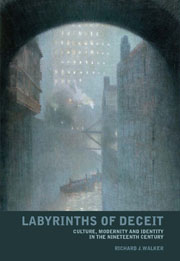Book contents
- Frontmatter
- Contents
- Acknowledgements
- Introduction: Tracing the fragments of modernity
- Part I (De)Generating doubles: duality and the split personality in the prose writing of James Hogg, Robert Louis Stevenson and Oscar Wilde
- Part II The stripping of the halo: religion and identity in the poetry of Alfred Tennyson, James ‘B. V.’ Thomson and Gerard Manley Hopkins
- Part III Infected ecstasy: addiction and modernity in the work of Thomas De Quincey, Alfred Tennyson, Christina Rossetti and Bram Stoker
- Conclusion: Ghost-script
- Notes
- Bibliography
- Index
Conclusion: Ghost-script
- Frontmatter
- Contents
- Acknowledgements
- Introduction: Tracing the fragments of modernity
- Part I (De)Generating doubles: duality and the split personality in the prose writing of James Hogg, Robert Louis Stevenson and Oscar Wilde
- Part II The stripping of the halo: religion and identity in the poetry of Alfred Tennyson, James ‘B. V.’ Thomson and Gerard Manley Hopkins
- Part III Infected ecstasy: addiction and modernity in the work of Thomas De Quincey, Alfred Tennyson, Christina Rossetti and Bram Stoker
- Conclusion: Ghost-script
- Notes
- Bibliography
- Index
Summary
Unreal City
Under the brown fog of a winter dawn,
A crowd flowed over London, so many,
I had not thought death had undone so many.
Sighs, short and infrequent, were exhaled,
And each man fixed his eyes before his feet.
It is somehow appropriate that this book should close with a discussion of the vampire, for its shadowy, vaporous and shifting presence draws together and metaphorises many of the issues which have been significant throughout it. If my initial premise has been to explore the nature of identity for the individual within nineteenth-century modernity through its representation in a variety of different cultural texts and intertexts, what then can be said about the state of identity in the nineteenth century? As should be clear by now, identity, certainly in terms of its representation in the works scrutinized here, can be seen to be in a state of flux, crisis and transition in all sorts of different configurations. Marx and Engels's claim that modernity for the nineteenth-century bourgeoisie consists of constant and destabilizing revolution and reinvention – encapsulated in the all too familiar phrase ‘[a]ll that is solid melts into air’ so usefully interrogated by Marshall Berman – goes some way to explain why identity should have such unstable qualities during the period. The reasons for this dislocation, subsumed within the broad spectrum of analysis offered in the Communist Manifesto, are manifold.
- Type
- Chapter
- Information
- Labyrinths of DeceitCulture, Modernity and Identity in the Nineteenth Century, pp. 284 - 292Publisher: Liverpool University PressPrint publication year: 2008



